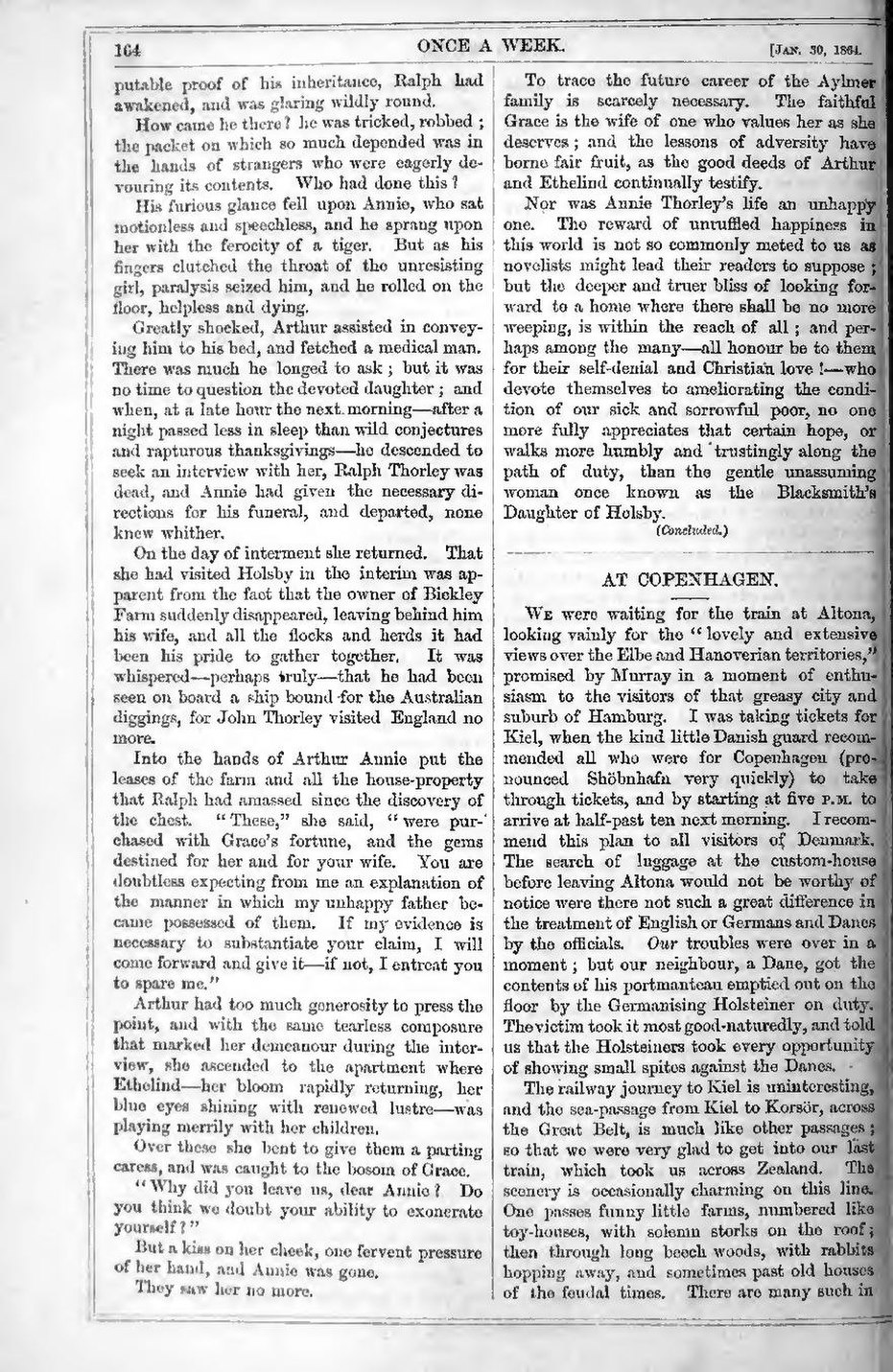putable proof of his inheritance, Ralph had awakened, and was glaring wildly round.
How came he there? he was tricked, robbed; the packet on which so much depended was in the hands of strangers who were eagerly devouring its contents. Who had done this?
His furious glance fell upon Annie, who sat motionless and speechless, and he sprang upon her with the ferocity of a tiger. But as his fingers clutched the throat of the unresisting girl, paralysis seized him, and he rolled on the floor, helpless and dying.
Greatly shocked, Arthur assisted in conveying him to his bed, and fetched a medical man. There was much he longed to ask; but it was no time to question the devoted daughter; and when, at a late hour the next morning—after a night passed less in sleep than wild conjectures and rapturous thanksgivings—ho descended to seek an interview with her, Ralph Thorley was dead, and Annie had given the necessary directions for his funeral, and departed, none knew whither.
On the day of interment she returned. That she had visited Holsby in the interim was apparent from the fact that the owner of Bickley Farm suddenly disappeared, leaving behind him his wife, and all the flocks and herds it had been his pride to gather together. It was whispered—perhaps truly—that he had been seen on board a ship bound for the Australian diggings, for John Thorley visited England no more.
Into the hands of Arthur Annie put the leases of the farm and all the house-property that Ralph had amassed since the discovery of the chest. “These,” she said, “were purchased with Grace’s fortune, and the gems destined for her and for your wife. You are doubtless expecting from me an explanation of the manner in which my unhappy father became possessed of them. If my evidence is necessary to substantiate your claim, I will come forward and give it—if not, I entreat you to spare me.”
Arthur had too much generosity to press the point, and with the same tearless composure that marked her demeanour during the interview, she ascended to the apartment where Ethelind—her bloom rapidly returning, her blue eyes shining with renewed lustre—was playing merrily with her children.
Over these she bent to give them a parting caress, and was caught to the bosom of Grace.
“Why did you leave us, dear Annie? Do you think we doubt your ability to exonerate yourself?”
But a kiss on her cheek, one fervent pressure of her hand, and Annie was gone.
They saw her no more.
To trace the future career of the Aylmer family is scarcely necessary. The faithful Grace is the wife of one who values her as she deserves; and the lessons of adversity have borne fair fruit, as the good deeds of Arthur and Ethelind continually testify.
Nor was Annie Thorley’s life an unhappy one. The reward of unruffled happiness in this world is not so commonly meted to us as novelists might lead their readers to suppose; but the deeper and truer bliss of looking forward to a home where there shall be no more weeping, is within the reach of all; and perhaps among the many—all honour be to them for their self-denial and Christian love!—who devote themselves to ameliorating the condition of our sick and sorrowful poor, no one more fully appreciates that certain hope, or walks more humbly and trustingly along the path of duty, than the gentle unassuming woman once known as the Blacksmith’s Daughter of Holsby
(Concluded.)
AT COPENHAGEN
We were waiting for the train at Altona, looking vainly for the “lovely and extensive views over the Elbe and Hanoverian territories,” promised by Murray in a moment of enthusiasm to the visitors of that greasy city and suburb of Hamburg. I was taking tickets for Kiel, when the kind little Danish guard recommended all who were for Copenhagen (pronounced Shöbnhafn very quickly) to take through tickets, and by starting at five p.m. to arrive at half-past ten next morning. I recommend this plan to all visitors of Denmark. The search of luggage at the custom-house before leaving Altona would not be worthy of notice were there not such a great difference in the treatment of English or Germans and Danes by the officials. Our troubles were over in a moment; but our neighbour, a Dane, got the contents of his portmanteau emptied out on the floor by the Germanising Holsteiner on duty. The victim took it most good-naturedly, and told us that the Holsteiners took every opportunity of showing small spites against the Danes.
The railway journey to Kiel is uninteresting, and the sea-passage from Kiel to Korsör, across the Great Belt, is much like other passages;
so that we were very glad to get into our last train, which took us across Zeeland. The scenery is occasionally charming on this line. One passes funny little farms, numbered like toy-houses, with solemn storks on the roof; then through long beech woods, with rabbits hopping away, and sometimes past old houses of the feudal times. There are many such in